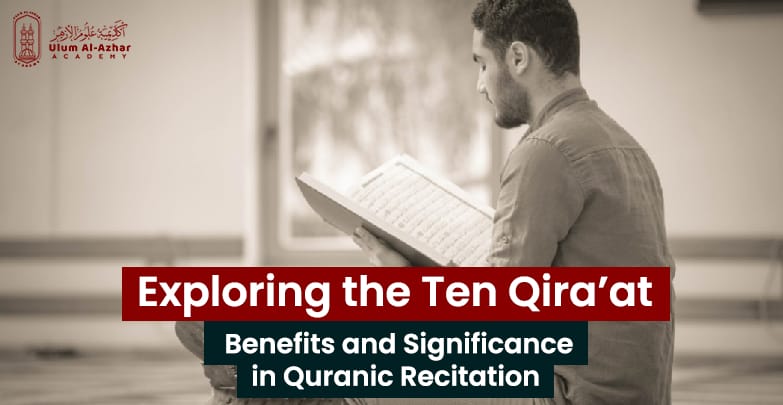
Benefits and Significance in Quranic Qiraat Recitation
- Posted by Ulum Al-Azhar Academy
- Categories Quranic Journey
- Date August 17, 2023
The first time I learned about the existence of various Qiraat recitations of the Quran, it sparked a series of unconventional thoughts in my mind. However, in contrast to my usual approach, I didn’t dismiss this idea immediately. Instead, I held onto it and delved deeper.
Rather than abandoning my curiosity, I chose to engage with different Sheikhs (Islamic scholars), read several books, and watch numerous videos. My motivation was to dispel my doubts and grow as a more knowledgeable and conscientious Muslim.
During that period, the question that drove me to seek answers mirrored the one that led me to explore this topic: What do the different Qiraat recitations of the Quran signify, and what is the reason for their existence? Let’s explore this in this article.
What Is Qiraat recitations ?
In simpler terms, Qiraat of the Quran can be understood as the specific manner in which the Quran is recited.
To learn the Ten Qira’at correctly and under the guidance of qualified instructors from Al-Azhar, Certainly, the Ten Qira’at Recitations can be studied at (Ulum Al-Azhar Academy). The Academy offers two types of study programs:
- The first type is theoretical study. This is a unique academic approach provided by Al-Azhar, making it the pioneer in offering this type of education. The Academy recognizes and comprehends the significance of theoretical study for students before practical application. It lays the foundation by ensuring a thorough understanding of the subject matter prior to practical implementation.
- The second type is the practical application of the Qira’at. This comes after the theoretical study and is led by graduate scholars of Al-Azhar. Students engage in practical exercises, receiving hands-on instruction in the Qiraat recitations.
The Qira’at Foundations
The 7 Types of Qiraat in the Quran
The term “7 Qiraat of the Quran” refers to the seven accepted methods of reciting the Holy Quran. These distinct recitation styles have been authenticated and passed down through generations, originating from Prophet Muhammad (PBUH) and transmitted to his followers. While different regions may have their variations of Quranic recitation, these seven Qira’at are universally recognized. Each style of recitation follows specific rules of pronunciation and emphasizes particular words, shaped by the unique delivery of each narrator.
The seven Qira’at of the Quran are endorsed by Islamic scholars and are named after their renowned reciters. They encompass Naafi’ al-Madani, Ibn Amr al-Basri, Abu Amr al-Basri, Ibn Kathir al-Makki, Abu Jafar al-Madani, Asim al-Kufi, and Hamzah al-Kufi. These recitation methods have gained such significance that they are incorporated into various aspects of Islamic practice, from mosque Qiraat recitations to radio and television broadcasts. As a result, the Qiraat recitations play a vital role in safeguarding the integrity of the Holy Quran for generations to come.
The Conditions for Correct Recitation
Several conditions must be fulfilled for a recitation to be considered correct. All of these conditions must be met; if none is not met, the recitation becomes weak, invalid, or irregular. The conditions are as follows:
- Conformity to the Arabic Language: The recitation must conform to the Arabic language, even if it is in only one aspect. Recitation is a followed Sunnah (tradition), and its acceptance requires a chain of narration (isnad), leaving no room for personal opinion.
- Conformity to the Script of the Mushaf: The recitation must match the script of the Quran, even if there is some possibility for variance. It is not necessary for the recitation to match all variations of the script; it is sufficient if it matches some of them.
- The authenticity of the Chain of Narration (Isnad): Since recitation is a Sunnah, both the narration and its chain of narration (isnad) must be authentic.
In a world of linguistic and cultural diversity, the Ten Qiraat recitations stands as a remarkable testament to the Quran’s adaptability, inspiring us to seek knowledge, appreciate linguistic nuances, and forge a meaningful connection with the words of Allah.
Tag:the Qira'at




